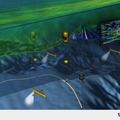Reasons for new strategies to study the ocean basins
Interactions among the atmosphere, ocean, and underlying seafloor are complex, extensive, and often poorly understood. Yet many of these interactions are critical to maintaining the habitability of the planet. Improving our ability to detect, follow, and forecast changes in the complex interactions among the atmosphere, the oceans, and the underlying seafloor depends upon predicting and understanding the ocean phenomena that can threaten or benefit humanity.
-
Changes in patterns of ocean temperature and currents can influence food production on continents and cause starvation and drought in areas far removed from coastlines.
-
Dangerous storms, deadly earthquakes, and killer tsunamis originate in the oceans.
-
Increasing levels of carbon dioxide, a greenhouse gas generated naturally and by human activities, are being absorbed into the oceans from the atmosphere. Many questions remain about the short- and long-term effects on marine animals and plants, including changes caused by ocean acidification.
-
Life at underwater volcanoes thrives without sunlight at extremely high temperatures and pressures, and feeds on a toxic brew of poisonous gases. The potential for new medicines and industrial processes based on the study of these extreme life forms has barely begun to be tapped. These extremophiles may also hold the key to the origins of life on Earth.
-
Massive deposits of frozen methane in the form of methane hydrate lie buried within the ocean sediments and may be a new energy source, a major contributor to climate change, or both.




